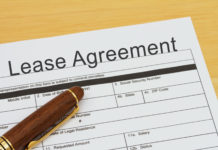Are you thinking of buying or renting in California?
If you answered ‘yes’, you’re smart. In fact, you’re very smart.
Renting has become extremely popular because it’s more affordable than purchasing a home, especially in California. The rental market is seeing a 50 year high. People from all income brackets are choosing to rent, rather than purchase a property.
It’s now the perfect time to lease your California property and make some extra income.
Also, remember: it’s important to be aware of the laws that govern lease agreements in the state.
Looking for a free California lease agreement? Check out these resources to find a template or create your own!
California Lease Agreement
First things first. If you’re a landlord in California, you’re pretty lucky.
Property here grows in value every year and rentals are in exceptionally high demand.
But, being a landlord in California is harder than most people realize. Along with the usual responsibilities, there’s a range of specific language that’s necessary for lease agreements.
A number of restrictions are in place, too. Everything from different eviction notices to varying security deposits. It’s complicated and requires serious concentration.
A California rental lease agreement is clearly not something to take lightly. It has serious implications for all involved.
California Rental Agreement Support
Due to the complications of owning or leasing property in California, property managers require assistance and support. Landlords and property managers help one other but also rely on professional support and guidance.
Luckily, these days, there are online directories leading people to support. Online communities exist to share information and offer tips. These work to help connect landlords and property managers with each other too.
It’s essential for landlords in California to be clued up on the updated regulations and rules. Research focusing on trustworthy resources is useful when finding out about the latest rental agreement regulations.
Although the role of a California landlord is complex, they have the support of a number of educational tools and guidelines to utilize. Even the biggest tenant challenges have a solution, so it’s important to do your reading.
California Residential Lease Agreement
A Standard Residential Lease is the most basic and popular type of document used when renting property to an individual, known as a tenant. It is highly customizable, which is very important for landlords and property owners who wish to alter the agreement according to their needs and property type.
Although each lease can and should be customized for the specific situation, there are three main subjects a lease should include.
These are the length of time (term), the type of deposit (security or pet), and the amount payable per month.
A lease is a non-negotiable part of protecting the rights of both the tenant and the landlord. It ensures that both parties know their specific responsibilities and rights, according to the state.
What’s Included in a Residential Lease?
In addition to the three basic sections mentioned above, a residential lease includes reasons for breaking the lease. These reasons are stipulated because they wouldn’t find the tenant in breach of contract.
Although a tenant may break the lease at any time, there are common clauses that don’t hold a penalty for breaking the lease, such as:
- The health of the tenant or an immediate family member that requires relocation
- Military or Government associated leave (State and Federal laws have authority over the rules to which the termination can occur)
- Relocation in relation to tenant’s current or new job (dependent on local state laws)
In addition to these, the lease can be reviewed for early termination clauses that allow it to be broken with no penalty. If no clauses occur, the tenant may attempt to have legal clauses added to allow for the lease to be broken without penalty.
These clauses are provided only at the discretion of the landlord. The property management company can also provide them if acting on behalf of the best interest of the landlord.
How to Write a California Lease Agreement
California lease agreements must adhere to California laws. If not, they’re unenforceable in state court. There’s a range of laws to follow in this regard, so be sure to do proper research.
If you’re a tenant, ensure you carefully read the terms in a California lease agreement before you sign it.
As soon as you sign the contract, you’re legally bound to the obligations listed. Remember to ask questions before signing. Don’t feel uncomfortable asking questions; it’s your right as a tenant to understand the terms fully.
In the case that you disagree with the terms, you may ask for a written modification. It’s critical that you get the changes made in writing. This is the only way you’ll receive protection in the case you end up in court over a lease agreement violation.
Along with this, remember that you have the right to get an attorney to review a California lease agreement before you sign it.
Lastly, don’t forget that a California lease agreement needs the landlord’s full name and/or the property management company’s legal business name. In addition, it must display the full names of the tenant(s). The property address must also be included.
What About Disclosures?
In California, there are several required disclosures. Along with this, there are optional disclosures.
The lease should explain when the landlord, property management company, or their authorized agent may have access to the property. Generally, the landlord must provide at least 24 hours of notice for a non-emergency reason or for maintenance.
Under California law, landlords must provide 48-hour notice for move out inspections.
A bedbug addendum must be provided by the landlord. This explains that the landlord had no prior knowledge of existing bedbugs before the tenant moved in. In addition, the tenant must confirm that their furniture doesn’t have bedbugs before they move into the property.
If a landlord received any permit to demolish a residential unit, a demolition disclosure must be used. The landlord must inform the tenant about it in the disclosure before the landlord accepts a California lease agreement or deposit.
If the landlord has defaulted on the mortgage, they have to tell the tenant at the time or before the lease is signed.
California Lease Agreement Deposits
The maximum security deposit that a landlord can charge in California depends whether the unit is furnished or not.
The security deposit for an unfurnished unit can be no more than two months rent. A security deposit for a furnished unit can be no more than three months rent.
According to state law, the landlord must return any and all deposits due to the tenant (minus deductions documented on an itemized statement) within 21 days.
Remember that in all 50 States a lease agreement does not need a signature with a witness or notary public as long as it’s for no more than a period of one year.
Where to Find a California Lease Agreement
The most commonly used California lease agreements include an apartment lease, a roommate agreement, commercial lease agreement, month to month lease, and a standard residential lease agreement.
Of course, each of these should include separate sections relevant for their unique use. The needs and priorities of the landlords and tenants in each of these lease agreements will vary widely.
However, some of the most commonly used California lease agreements share many of the same elements. Others will include distinct differences, such as a roommate agreement.
This type of agreement outlines which areas in the house or apartment may be used by all residents and which are for the exclusive use of certain roommates.
The Next Steps
It’s time to look at the next steps. You know what you need to do. But how are you going to do it?
Due to this variation in different lease agreements in California, it’s helpful to have the support and guidance of professionals. Both landlords and tenants can benefit from the expertise of consultants who know about the lease agreement laws in the state of California.
Without support from those who know best, you may find the California lease agreement process much more complicated than it needs to be.




















